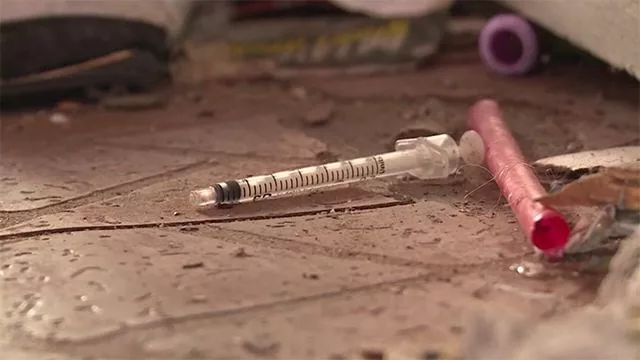ST ALBANS, Vt. (WCAX) – Police may play an important role in fighting Vermont’s drug problem. Officers make arrests but can also give offenders a chance at recovery.
“Anything I could do to get my hands on money, including check fraud and forgery,” said Ben Kaufmann of St. Albans.
Kaufmann was a high school student when he got addicted to opiates. He couldn’t kick the habit, resorting to armed robbery and crime to get heroin.
“I was at a point where– I don’t like the term rock bottom, but I was defeated,” he said.
Former St. Albans Police Ofc. George Rodriguez picked Kaufmann up after one of those down, bad days and gave him a choice.
“One of the first things he said to me was, ‘Do you want to get some help? Clearly, you have a lot going on and do you want to get some help? Or do you want me to put you in jail?’” Kaufmann said.
“I never met a drug addict who wanted to be a drug addict. They always wanted a way out,” Rodriguez said. “So, you offer them a way if they’re willing to do the work.”
Kaufmann says it was this moment that changed his life.
Reporter Laura Ullman: Without that conversation with George, do you think you’d be where you are today?
Ben Kaufmann: No, absolutely not. Most likely I would be dead.
Rodriguez connected Kaufmann with Melinda White, a case worker with the Turning Point Center.
“For me, the St. Albans Police Department has been the number one referral partner for a very long time,” White said.
White says anyone entering recovery has a different path. Police intervention doesn’t work for everyone but police are often the first to encounter users who need help.
“Having a relationship with them can oftentimes get me reconnected with a person who wants help and then ultimately can get them the help that they need because I, on my own, or even treatment recovery services on their own– we can’t do it. It takes a village,” White said.
St. Albans Police Chief Maurice Lamothe says users who officers arrest still have to serve the consequences of their actions, but an approach that involves mental crisis counselors and recovery services has shown positive outcomes in St. Albans.
“I’ve been doing this 25 years; the drug crisis is not going away. And it’s not going to go away,” Lamothe said. “So, we have to chip at it, and the way to chip at it is to bring resources together.”
Kaufmann is also now part of the solution. He refers clients at the homeless shelter he works at to White for treatment.
“In a little way, giving back what I took from the community,” he said. “And I get a chance to help people who were in the same boat as me.”
White hopes the region can learn from St. Albans. Police are the first point of contact, and by working with recovery services, they’re likely to have fewer repeat offenders.

